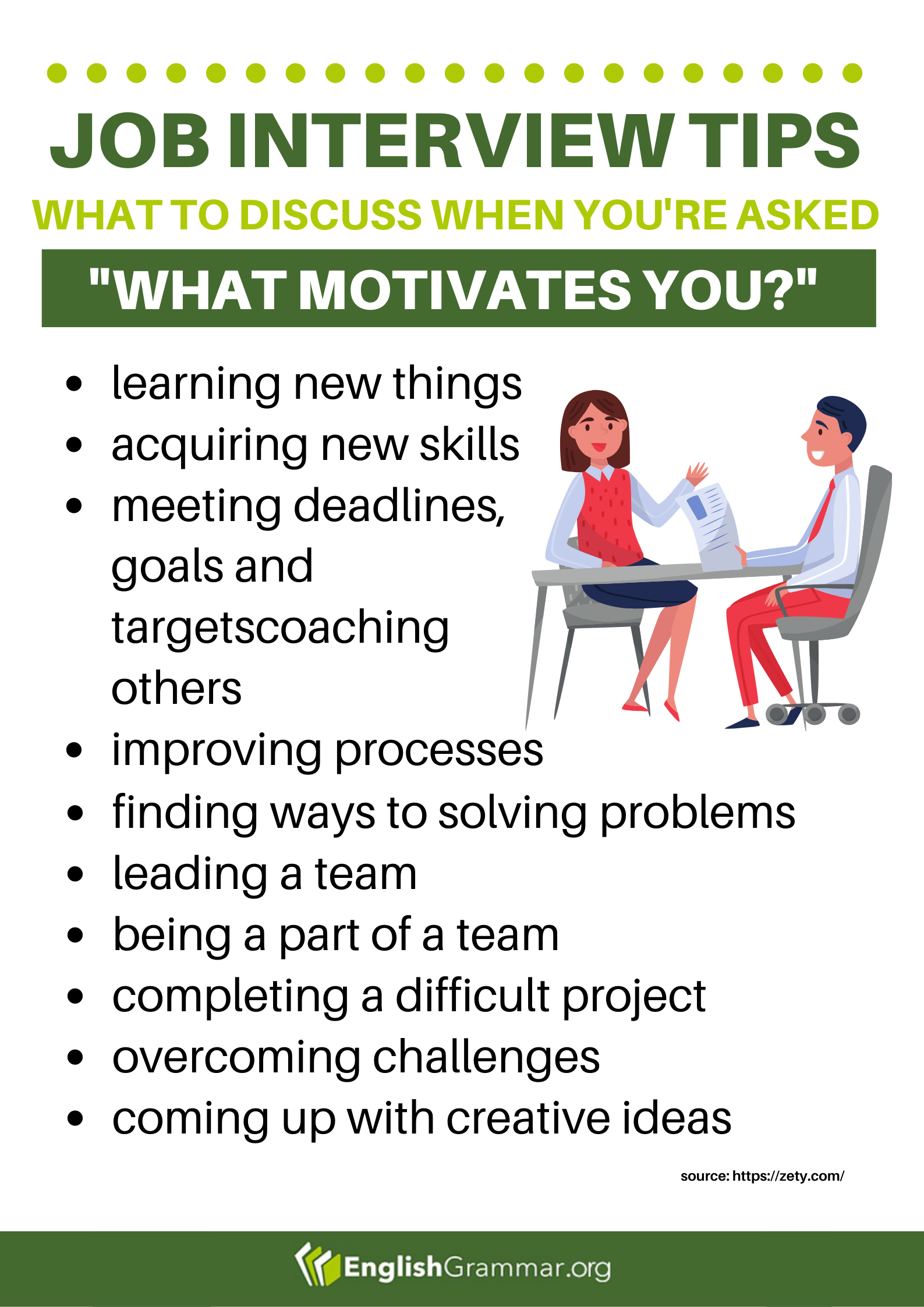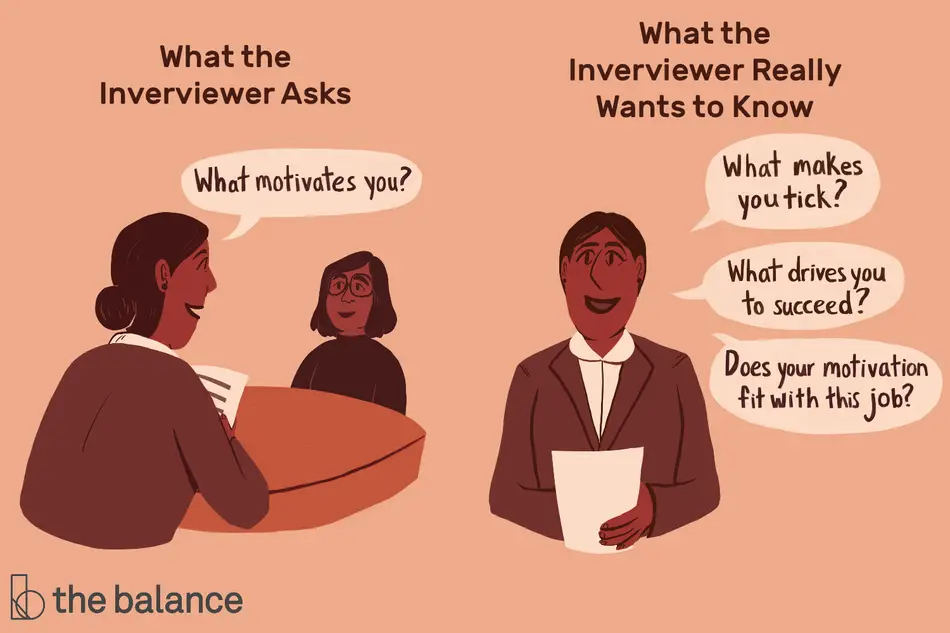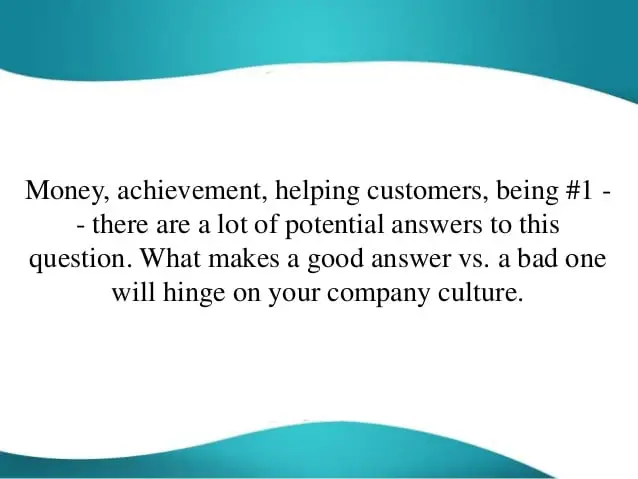Example Responses For The Question What Do You Find Motivating
You can prep for interviews by spending some time reflecting on your work life, skills, and strengths so that youre ready for whatever hiring managers throw at you. Check out these sample responses to the question, What motivates you? for inspiration:
Sample Answer 1 Clothing Store Sales Associate
I find it rewarding when customers leave happy. I take pride in providing the best service possible, and it feels good to go above and beyond so that a guest has a positive shopping experience. When Im able to assist somebody in finding the perfect fit or an outfit that makes them feel confident, I find that encouraging and feel thats what makes the job worthwhile.
Sample Answer 2 Hotel Housekeeper
One of the biggest reasons I enjoy cleaning is because I can see results. Instead of feeling discouraged when I walk into a dirty room, I view it as a fun challenge. I find it satisfying to compare the before and after when I finish a room, and that encourages me to keep going.
Looking For More Advice Or Preparation Tips
The interview is important but will never happen without a great resume. So, take a look at my guides on How Long Should A Cover Letter Be, How To Write An Introduction Letter, How To Write A Letter Of Interest, How To List Education On A Resume, How To List References On A Resume, Most Important Skills To Put On A Resume, and Job Titles On Resume for some helpful insight.
Common Demotivating Factors At Work
There’s no right or wrong answer to this question, so it’s important to be honest. But if you’ve never pondered what demotivates you, it can be tough to know where to even start. Learn about common demotivating factors and whether they ring true for you.
According to Lifehack, stress or fear is a major culprit behind demotivation at work, and it comes from many sources. Some employees constantly feel pressured due to micromanagement or a perceived lack of job security, which in turn saps enthusiasm and motivation. Other times, employees will feel demotivated when they feel like their hard work is going nowhere. Maybe they had high hopes of a promotion or raise, and it hasn’t materialized.
Forbes points out that it can also be hard to put in your best effort when you don’t respect company leadership. Maybe they constantly make decisions that affect you negatively or that you don’t agree with, and it’s made you feel like your work isn’t as important as you once thought. You can feel the same way about your coworkers. Finally, sheer boredom can demotivate anyone and lead to a lackluster performance.
Read Also: How To Say Thank You For An Interview
How To Answer This Interview Question
In order to give a good answer to this question, you need to understand that it is actually two interview questions in one
First off, we need to examine exactly how this question is different from the more traditional interview questions. Because this question requires serious self-examination, its a question you should be asking yourself long before the interviewer does.
While many basic interview questions can be answered off the top of your head, the question What motivates you is one that covers more than just your career history or salary requirements. Youre going to have to look at the whole big picture and realize in some ways this question is actually two questions in one:
What motivates you in lifeand what motivates you at work?
Reflect On Your Past Experiences

Think about what youre passionate about, says Jennifer Sukola, a Muse career coach and human resources professional. What is it that you find most gratifying in your work? If you can pinpoint those things, she explains, you have the basis of your answer.
Take some time to mull overand maybe even write out in a listthe aspects of previous jobs that excited and energized you most, the ones you always wanted to do more of or wished were your entire job. Perhaps it was being an active member of a team and contributing to a big project or spearheading a brand new initiative. Or maybe it was speaking to customers and making them feel heard. Or it might have been seeing your sales numbers go up and your name climb the leaderboard. Maybe it wasnt something in your day-to-day responsibilities at all, but something about the mission of the company or who it served.
Its definitely worth doing some self-reflection on, even if its not for an interview, says Tara Goodfellow, a Muse career coach and owner of Athena Consultants, Inc.
Read Also: How To Crack A Google Interview
To Assess Your Level Of Self
Prompting you to explain what motivates you at work is also a great way for a potential employer to gauge how well you know yourself, as well as your strengths and weaknesses. The answer you choose will reveal a lot about how you view yourself and your work so its important to prepare an answer beforehand which relates to the role you are applying for.
To Analyse Your Sources Of Motivation
Figuring out how you approach and view success is a fundamental concern to employers. This is because what you like doing and why you love doing it is directly related to your ambition. Employers will want to know if your motivations and ultimate career goals align with the role you have applied for.
Read Also: How To Say Thank You Email After Interview
How Would You Define A Great Day At Work In Your Previous Job
Take a minute and reflect on your previous jobs and consider the things that make you feel fulfilled. If there are any trends, identify them and consider what they inform you about your passion. For instance, perhaps your favourite memories from previous jobs involved solving complex problems or reaching a difficult goal. This can inform you that you are motivated by having the opportunity to overcome a challenge or being pushed out of your comfort zone.
Whats The One Thing You Want More Than Anything Else
Sometimes, to answer a big question, you need to think big-picture. Ask yourself, what is the one thing in life you want more than anything else? You might say that you want happy relationships, or to travel and see the world, or become a millionaire.
Once you have your answer, follow it up with this question: Why do I want that? Using the examples above, you might say that your relationships bring you joy, or you love the thrill of seeing new places, or you want to be comfortable and successful. Now were getting somewherethese motivations can more easily be turned into an answer for this question. You can talk about the value of work relationships, or how you like new experiences, or how you get your motivation from a sense of accomplishment and success.
Read Also: What Is A Pre Recorded Video Interview
What Motivates You Sample Answers
Lets get your creativity flowing by kicking things off with some actual answers for the popular interview question, What motivates you?
motivated by opportunities to identify and meet the needs of my workplace.During my junior year in college, I noticed a growing trend of drunk driving on campus. As a member of the student outreach organization, I decided I needed to get involved, so I developed an initiative to address the problem. Through flyers, lectures, focus groups, and email outreach, we reached over 8,000 students, and our free safe ride program was used over 400 times each month.
Why is this a great answer? It starts with a one-sentence summary, backs it up with a specific real-life example, and then connects that experience to how the candidate can have a similar impact at their new workplace. It also gets bonus points for including quantitative results. Lets look at one more example for someone without relevant work experience:
Motivation comes in many forms, and its transferable. Sports, volunteer work, hobbies, class projectstheyre all applicable. You just have to show how your motivation translated into results, so that the interviewer understands what your motivation can do for their company.
Myths About Social Justice Workand What It’s Really Like Instead
Working with nonprofits for her entire career, Maggie has run up against preconceived notions of what the field is like and what it looks like to build a fulfilling career within it. She’s shared some of those with us:
If you’re thinking you’d like to work for a nonprofit organization like Liberty Hill, Maggie encourages you to apply.
Recommended Reading: How To Email Someone After An Interview
Responses To The Question
These are a few short responses to the question what motivates you that can be combined with your personal knowledge and past experiences.
- Achieving targets or goals before deadlines
- Coaching and mentoring others in my area of expertise
- Being a functional member of a very productive team
- Leading a team to success
- Coming up with creative ideas to improve a working system or creating a new system altogether.
- Learning new things and applying them to my profession in order to improve my efficiency at work.
- My drive is for me to develop my work rate efficiency in order to improve the services of the establishment I work for.
- Executing a difficult task and getting validated for the work I have done.
- Ensuring that the work on a project gets the best result by spotting mistakes and errors and correcting them.
- I feel fulfilled when I find ways to solve difficult problems.
- Being productive as often as I can motivate me a lot, even on my days off.
- I like to challenge myself, improve my potential, and grow on a professional level.
- I enjoy learning and building up relevant knowledge learning on the job helps me grow not just professionally, but personally as well.
- I feel a sense of accomplishment when I successfully complete a milestone or accomplish a short term goal.
- Especially when I have a lot of tasks at hand to execute.
What Not To Say When Answering What Motivates You

While interviewers generally arent trying to fool you, there are a few tricky situations to be aware of when answering this question. Understanding common mistakes can help you avoid them during your interview. It can also help to remember that your answer should support your ultimate interview goal: compel the employer to hire you.
- Stay positive: Avoid discussing any negative motivators as thats typically seen as an undesirable quality. This can be especially challenging if the interviewer uses slightly different phrasing, such as, What motivated you to apply for this position? Rather than expressing doubts about your current job or employer, talk about why youre passionate about the new role responsibilities.
- Stay focused: Keep your answers work-related and focused on a specific experience. Advanced preparation can help with this. If your answer is too vague, rambling or generic, you might risk sounding inauthentic and unprepared.
- Stay relevant: Take advantage of the opportunity to show how your motivations make you the most qualified candidate for the job. While its okay to be motivated by a high salary or generous benefits, employers usually seek to hire candidates who have a deeper connection and commitment to the actual job.
Also Check: What Questions Do They Ask You At A Job Interview
Think About What Motivates You
Another way to tackle this question is to think about what motivates you. When your enthusiasm lags and you spend all day watching the clock, what do you think about to dig deep and continue working? Perhaps it’s the thought of your family depending on your paycheck. In that case, not being fairly compensated would demotivate you.
But most employers hope to find candidates interested in more than just a paycheck, so keep thinking. Do you get a morale boost when your boss recognizes your good work? When you feel like you can rely on your coworkers no matter what? It could even be that you feel motivated at work whenever there’s a steady supply of snacks, dress-down days, team bonding exercises and other perks.
When you’ve identified a few things that help you keep a positive attitude, twist them into their opposites to find your demotivating factors. For example, you might be demotivated when your boss only points out your mistakes, when your co-workers ignore you when you ask for their help or when the company doesn’t seem to view you as a person.
What Made You Apply To The Role Once You Read The Job Description
Review the job description and single out the duties or responsibilities that made you feel that you needed to apply to the job. For example, you can say that you were motivated by the chance to create something new or realise the tangible results of your efforts if you loved the prospect of working at a startup and building a new software application.
Also Check: How To Prepare For Amazon Sde 2 Interview
Sample Answer : Travel Agent
Im motivated by growing our repeat client base by forming successful relationships with new clients.
Last summer, I attended the TNT Travel Show and made contact with 40 potential clients. Of that number, 25 went on to book at least one trip with me 8 of which were round-the-world itineraries.
Since their return, 16 have approached me to discuss booking further trips and have recommended myself and our agency to their friends and family, 4 of whom have already booked on a cruise with us next July. That gave me a real sense of achievement.
Sample Answer : General Sales Manager
Im motivated by building and coaching a successful team to ensure we meet and exceed targets.
For example, I worked closely with one of my junior sales team in my previous role to ensure he developed the sales and negotiation skills he needed to succeed. Hed been struggling but, as a result of the work we did together, for the past quarter hes exceeded his targets by 30%.
This has not only boosted his and the entire teams overall performance, commission and morale, it has also given me a real sense of pride to have been part of his professional development and success.
Read Also: How To Prepare For An Interview At Amazon
Why Do Employers Ask What Is Your Motivation
Motivation can carry you far in both your daily life and your career. Being skilled is half the battle, but to progress in your career, you need to have the motivation to work harder and smarter. When employers ask this question, they are trying to gauge how well you will perform in the advertised position, and they want the position to be filled by a productive worker who wants to be there.
Why Employers Ask What Motivates You
Employers ask this question to see what gets you excited and makes you productive at work. They want to know what drives you. Your answer gives employers an idea of how you will fit into the company culture and what kind of employee you will beteam-oriented, self-motivated or goal-oriented.
The What motivates you? question has any number of different responses. If youre unsure what to focus on, think about what got you excited at previous jobs:
- What were the types of tasks that you were eager to work on and why?
- Did you enjoy contributing to and being supported by a team?
- Were you passionate about the mission of the organization and proud to see your work make an impact?
- Did you enjoy the satisfaction of seeing positive results from your work?
- Did you like working independently?
- Did you like setting and achieving goals?
You May Like: How To Pass Coding Interview
How To Approach The Graduate Interview Question What Motivates You
When preparing to answer this question, you should think about:
- What do you enjoy doing? Think about your course and your wider interests. What do they have in common?
- What have you enjoyed while working at your part-time jobs or internships? What did you look forward to? When you came home feeling that you’d had a good day, what kind of tasks or projects had you tackled?
- What sort of tasks are you best at? In what sort of environments do you work the best?
For example, are you well suited to working as part of a team? Do you work at your best when you have an imminent deadline or do you crumble?
Then think about the skills sought by the employer and the nature of the job you will be doing.
Motivation Questions In Strengths

Questions about motivation are commonly used in strengths-based interviews, which focus on what you enjoy doing and what you do well. Other ways of asking about motivation include ‘What motivates you in life?’ and ‘What are you passionate about?’
It’s wise to be prepared for both strengths-based and competency-based questions, as you may well be asked a mixture of the two, whether you’re facing a phone interview, a video interview or meeting the recruiter face-to-face. Many graduate employers now use strengths-based assessments as part of the recruitment process. According to a survey of members of the Institute of Student Employers published in September 2019, 50% of employers now use some form of strengths-based approach as part of the recruitment process.
Also Check: How To Get A Radio Interview